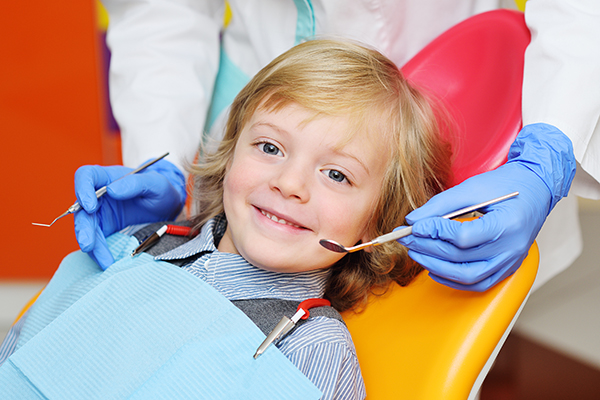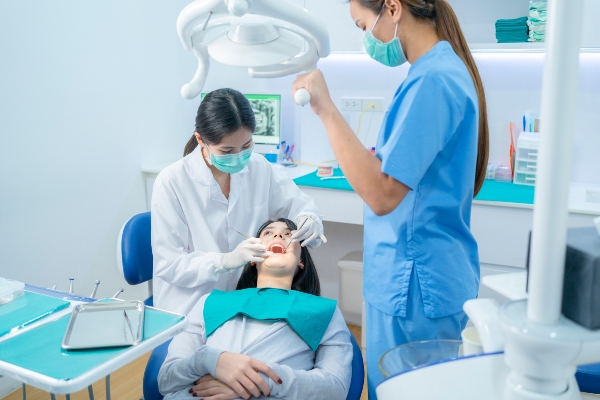What You Should Know About Emergency Pediatric Dental Care

Emergency pediatric dental care is important to know as a parent. Your child’s dental health is important. Knowing what to do right away when dental emergencies arise can preserve the integrity of your child’s teeth and gums. If you want to find out more about emergency pediatric dental care, here are the details.
Too much gum bleeding
Sometimes, gums bleed during brushing or flossing. The amount of blood here is tiny and does not need treatment. Gum bleeding needs attention if it is in excess. This type of bleeding results from a gum infection.
The parent should clean the bleeding areas while applying pressure on them with a damp cloth or paper towel. Then, the parent should call the dentist for the emergency pediatric dental procedure. After the procedure, the pediatric dentist will prescribe antibiotics. The medication will help stop the infection and prevent it from spreading.
Cracked or chipped teeth
Children often crack or chip teeth. This happens after a fall. This may not even cause any pain at all. Even so, this is still a type of dental emergency because damage can worsen if it does not receive immediate treatment. A chip across the top corner of a tooth may not be that obvious. The parent should watch that tooth while waiting for the day of the dental appointment.
A cracked tooth that runs vertically or diagonally across the child’s tooth should receive emergency pediatric dental treatment. The crack may deepen or creep closer to the tooth’s root. This will cause structural damage. Worst of all, this will cause the child terrible pain.
Severe dental pain
Pain in the child’s teeth or jaw can sometimes go away with ibuprofen for kids. If the pain does not stop or reduce after a few hours, the parent should call the pediatric dentist. Then, the clinic could schedule an emergency pediatric dental appointment. It is important to address the child’s pain right away.
Lost fillings
A child can lose a dental filling during play or even during eating. Dental fillings can start to loosen. If the parents do not notice it, the filling can fall out. The pediatric dentist should replace the child’s dental filling right away. This will prevent the entry of bacteria into the existing dental cavity.
Dental displacement
Children can also experience tooth displacement. The trauma does not push the tooth out of its socket. Instead, it sits halfway in its socket, sitting at an angle. A displaced baby tooth corrects itself. A displaced permanent tooth must receive emergency pediatric dental treatment from the pediatric dentist.
Metallic taste in the mouth
This is a warning that a tooth is going through the stages of infection. Dental fillings can crack and loosen. This will leave the tooth open for possible infections. The cavity inside the tooth may already be progressing. Seeing the dentist can prevent root canal treatment or even tooth loss.
Presence of a lesion or growth
Any lesion or growth in the mouth needs immediate dental care. This could be a sign of oral cancer or infection. The dentist can perform a visual cancer screening. Tools and equipment can also help determine any abnormalities in the mouth. The dentist can then start immediate treatment or refer to another dental health professional.
Swelling
This is a significant sign of infection, which is life-threatening. Seeing a dentist right away can provide immediate treatments. The goal is to remove the swelling and pain. Lymph nodes, gums, or the face can swell up. Telling the dentist about the location, degree, length, and symptoms of infection is important.
Sudden loss of a tooth
Losing a tooth as an adult is painful. It is also not aesthetically pleasing. A knocked-out tooth needs a dentist’s help. The tooth may still be re-implanted within the hour.
Popping jaw
A popping sensation and pain in the jaw or a locked jaw needs an emergency appointment with the dentist. In some cases, the jaw becomes stuck. Pain could arise when chewing or yawning. The jaw may also have a limitation in movement. The dentist can check the TMJ problem and suggest treatments.
Emergency pediatric dental care can bring back your child’s smile
Accidents happen. An innocent fall can result in a dental emergency. Being aware of your child’s dental emergency can help keep your child’s mouth healthy. It can be stressful for both you and your child when this happens. Your child deserves optimal pediatric dental care, especially during these challenging times. An emergency pediatric dental appointment can relieve your child’s discomfort right away.
Are you considering a pediatric dental treatment in the Middletown area? Get more information at https://www.hvkidsmiles.com.
Check out what others are saying about our dental services on Yelp: Pediatric Dentist in Middletown, NY.
Recent Posts
Cavity treatment for kids is essential for a child’s oral health. Dental decay can cause discomfort, causing the child to lose focus at school. It can even result in low self-esteem and malnutrition. Treating cavities can improve your child’s general health. Here are effective techniques for cavity treatment for kids.There are cases when fillings cannot…
Parents play a crucial role in their children's tooth care by ensuring their children get started on the right path to optimal dental health. This involves overseeing children's tooth care at home while also helping them develop healthy dental habits and ensuring they see a pediatric dentist regularly.Parents will need to keep their child's mouth…
Just like adults, children need preventive dental care — that is where pediatric dentistry comes in. Many parents believe that their child's teeth are healthy simply because their child is young. The truth is that oral health issues are as prevalent in kids as much as adults. Since they love sugary treats, the risk of…
Children have a great deal of growing and changing to do before they come into their adult smile, which often means parents fail to consider cosmetic dentistry for children as an option. However, cosmetic dental services can make a big difference for kids at this vulnerable age, when they may be prone to bullying and…


